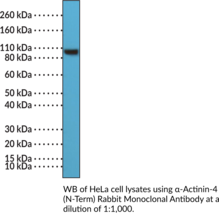Description
α-Actinin-4 (ACTN4) is a filamentous actin-crosslinking protein and member of the α-actinin protein family with roles in the regulation of cytoskeletal integrity and cell movement, as well as gene transcription.{59664,59662} It is composed of an N-terminal actin-binding region with two calponin-homology repeats, a rod domain containing four spectrin-like repeats that is essential for anti-parallel dimerization, and a C-terminal calmodulin-like domain.{59664} ACTN4 is ubiquitously expressed in non-muscle cells and primarily localized to the cytoplasm where it participates in cytoskeletal organization.{59662} However, ACTN4 can be translocated to the nucleus and induce transcription via interaction with nuclear receptors, including estrogen receptor α, retinoic acid receptors (RARs), and the vitamin D receptor, and acts as a transcriptional co-activator of NF-κB. Mutation of ACTN4 induces podocyte injury caused by cytoskeletal dysregulation and proteotoxicity and has been seen in patients with hereditary focal segmental glomerulosclerosis.{59663} ACTN4 is overexpressed and associated with tumor metastasis in various cancers.{59662} Cayman’s α-Actinin-4 (N-Term) Rabbit Monoclonal Antibody can be used for immunohistochemistry (IHC) and Western blot (WB) applications.
Synonyms: ACTN4|Focal Segmental Glomerulosclerosis 1|FSGS1
Immunogen: Peptide from the N-terminal region of human ACTN4
Formulation: 100 µl of protein A-affinity purified monoclonal antibody
Isotype: IgG
Applications: IHC and WB
Origin:
Stability: 365 days
Application|Immunohistochemistry||Application|Western Blot||Product Type|Antibodies|Monoclonal Antibodies||Research Area|Cancer|Cell Migration & Metastasis||Research Area|Cardiovascular System|Kidney & Renal Disease||Research Area|Cell Biology|Cell Signaling|NF-κB Signaling||Research Area|Cell Biology|Cytoskeleton & Motor Proteins||Research Area|Endocrinology & Metabolism|Hormones & Receptors|Estrogens & Progestins||Research Area|Endocrinology & Metabolism|Hormones & Receptors|RARs, RORs, & RXRs||Research Area|Endocrinology & Metabolism|Hormones & Receptors|Vitamin D Receptor||Research Area|Epigenetics, Transcription, & Translation|Transcription Factors

